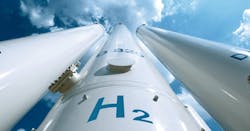Siemens and Boson Energy Collaborate on Conversion of Non-Recyclable Waste into Clean Energy
Boson Energy and Siemens have signed a Memorandum of Understanding (MoU) to expedite collaboration on technology converting non-recyclable waste into clean energy.
The partnership will help develop sustainable, local energy security for hydrogen-powered electric vehicle charging infrastructure without compromising grid stability or impacting consumer prices.
Siemens will assist Boson Energy in building a blueprint to create a scalable and repeatable solution by applying technologies within digital services and software for optimization, standardization, and simulation during both the manufacturing and operational phases.
Boson Energy helps decarbonize with its distributed production of local energy and chemicals, turning non-recyclable waste into sustainable hydrogen, which is cost-competitive to fossil fuels at the point of use.
The process is achieved by integrating the company’s Hydrogen by Plasma Assisted Gasification (HPAG) technology into an energy hub solution that sustainably realizes waste's significant circular hydrogen potential. The hydrogen produced supports off-grid applications like fast charging and facilitates more reliable grid operations.
"The collaboration with Boson Energy represents a significant step forward in our commitment to advancing technologies toward CO2 reduction," said Stephan May, CEO of Electrification and Automation at Siemens Smart Infrastructure. "By leveraging the breadth of our comprehensive portfolio, we aim to create a scalable and efficient model for converting waste into clean hydrogen."
Boson Energy aims for more than 300 plants in order to produce 1 million tons of circular hydrogen from waste by 2030, avoiding up to 30 million tons of CO2 emissions per year. The company is looking for a global presence, starting from Sweden, Poland, and Germany and continuing throughout Europe.
